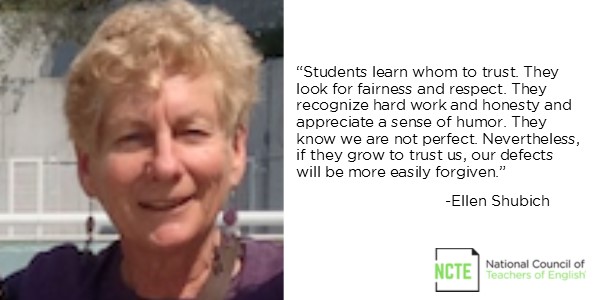This is a guest post by Ellen Shubich.
An article published in The Daily Beast on January 12, 2017, analyzing Megyn Kelly’s reputation as “the most trusted name in the news” got me thinking about trust and teaching.
In summary, the article states that Kelly has several characteristics that enable her to establish trust with her audiences. Her independent opinions and ideas, openly expressed, are backed up with detailed commentary rather than general statements. She is willing to show vulnerability, admits to imperfection, and acknowledges when she does not know something. Her sense of humor, humility, and insightful self-reflection reveal her humanity. Her use of first-person pronouns creates a personal connection with the audience.
This analysis sent my thoughts on trust and teaching in two directions. The first focused on the overwhelming information that teachers and students must make sense of. Who is trustworthy? What can be trusted?
To manage the task, so many skills—observation, listening, reading, writing, inquiry, etc.—must be brought to the process. And even when teachers and students seek credible sources, compare different opinions, gather evidence, and are aware of personal bias that may interfere with objective analysis, the time required to do all of this is often just not available. So much must be mastered and continually put into practice.
The second direction focused on teachers building trusting relationships with students. Trust is something teachers are made aware of early on in their training. We are urged to create a “safe” environment in which students feel comfortable and confident, a place in which healthy growth is nurtured.
And though Megyn Kelly may have the characteristics essential to building trust, many of us have to work on these qualities. For those teachers who have not kept up with advances in technology, students’ expertise may make them feel insecure and unwilling to admit they may not be in the “know.” For others, a good sense of humor is sometimes hard to maintain when faced with so many extra job responsibilities and numerous students with individual, special needs. Insightful self-reflection requires a great deal of honesty; some find it difficult to accept critical, though respectful, feedback and suggestions.
Students learn whom to trust. They look for fairness and respect. They recognize hard work and honesty and appreciate a sense of humor. They know we are not perfect. Nevertheless, if they grow to trust us, our defects will be more easily forgiven.
Ellen Schubich was born and raised in the Bronx and moved to Mexico 48 years ago when she married. She has a B.S.N. degree from Cornell University-New York Hospital and a Masters Degree in Educational Administration from the Universidad La Salle. Ellen has held many different positions: nurse, gerontologist, teacher of nursing, English teacher, coordinator, principal (Elementary and Middle School), and English principal. She is married, has a son and daughter and three grandchildren.

